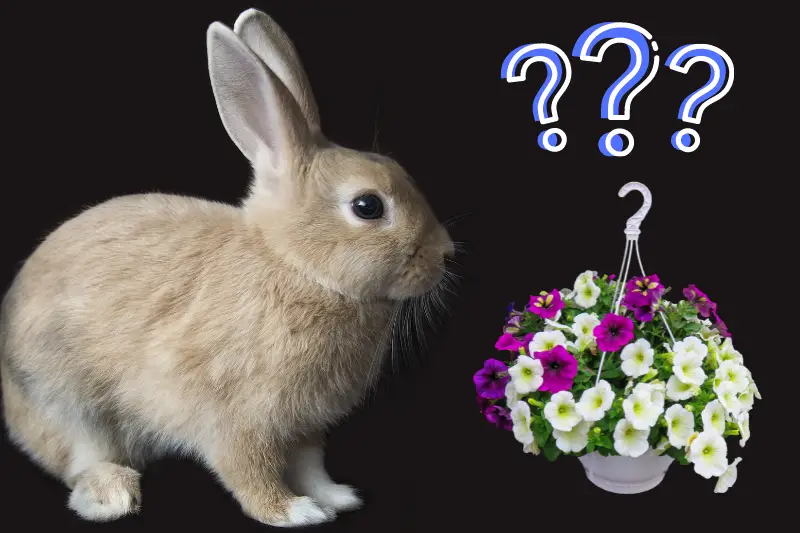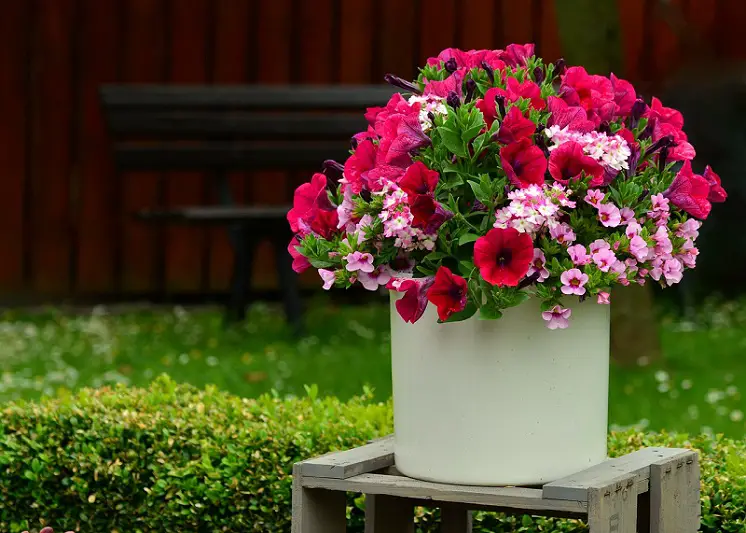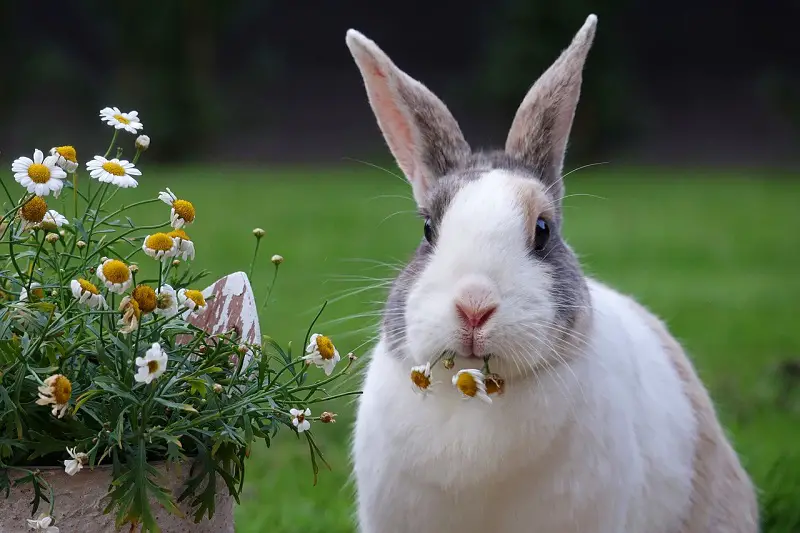Last Updated on June 12, 2023 by Leonard Harper
Some rabbits actually have a habit of nibbling on flowers, so it shouldn’t surprise you whether do rabbits eat petunias.
Rabbits enjoy feeding on young soft shoots of plants like lettuce and broccoli. They will also nibble on flowers like marigolds, pansies, and gazanias. If you let them out in a garden, they roam around and forage as if they were in the wild.
But will they feed on your lovely petunias too? Did you find your petunias eaten and are wondering if a rabbit ate them? Well, yes, rabbits do eat petunias, and they can eat the flowers if they are in your garden.
Contents

What are Petunias?
Petunias are soft flowering plants originally from South America. They are very common and popular with gardeners because they add color to gardens.
There are more than 20 different species of petunias and they bloom all year long. They come in various sizes, and the petals have many attractive colors apart from brown. This makes them a favorite choice for ornamental home flowers.
The plants grow low, spread out widely, and do well in most soils. The flowers have single or double heads.

Why do Rabbits Chew Flowers?
You may feed your bunny a well-balanced diet that has enough hay and provide them with chew toys, but they will still end up on your flowerbeds.
The reason why they chew your flowers is not that they are lacking anything. It is simply because they find the flowers delicious. Your petunias taste good for them and chewing on them also helps in wearing down their teeth.
What do Rabbits Eat?
Rabbits should have a regular supply of hay at all times. Hay is their main diet and it should make up 70% of what they eat. You can also offer some fresh grass with the hay.
A rabbit’s diet should have vegetables like broccoli and leafy greens like spinach. Add in some fruits like watermelon, herbs like mint and a few rabbit pellets.
Which Plants are Toxic to Rabbits?
Some plants are toxic to rabbits, and you should keep your pet away from them. They include but are not limited to the following common plants and flowers:
- Lilies
- Azaleas
- Chrysanthemum
- Poppies
- Buttercups
- Foxgloves
- Tulips
- Bluebells
- Carnations
- Irises
What to do if Rabbits Eat Toxic Plants
Rabbits are opportunistic, and they will feed on anything that is readily available to them. They may not be able to differentiate between what is safe and what is toxic to them.
If your bunny accidentally feeds on a toxic plant, check the plant and ascertain how much of it they have eaten. If it is just a small amount, it will likely not cause harm to them.
However, if they have eaten a good amount of it, take them to a vet immediately. Toxic plants can be deadly. Take measures to keep your pet from having access to them.
How to Determine That a Plant Was Eaten by Rabbits

If you woke up and found your garden raided and plants are eaten, you could have various culprits from deers to rodents.
Deers can eat plants that are 6 feet tall and they will leave the stems with ragged cuts.
Rabbits will only be able to eat 3 feet tall plants. They bite shoots and leaves with their upper and lower incisors. If the plants have clean uniform cuts at a 45° angle, then the culprit is a rabbit.
Look around the garden for pea-sized droppings that could be in a pile or scattered around the garden. You may also notice signs of digging near shrubs or bits of fur stuck on branches. These are all signs of rabbit invasion.
How to Prevent Rabbits from Eating Petunias
Rabbits have a tendency of cleaning up gardens overnight. They are adorable pets but also common pests for gardeners. They could be your own rabbits, a neighbor’s bunnies, or wild rabbits.
Here are ways to prevent them from eating your garden plants including petunias:
Fence the garden
Use 1-inch chicken wire to fence your garden. Dig it a few inches under the ground and bury it facing outwards away from the plants. Raise the wire at least 3 inches upwards to keep out jumping bunnies.
You can also place a net over your plants. A net will prevent them from biting off the shoots. Check the fence or net often because rabbits can make holes in them.
Plant in raised containers
Plant your flowers in raised containers and flowerbeds. The higher they are, the harder it will be for your rabbit to reach them and do damage.
Alternatively, you can hang the plants. If you have cascading petunias like the purple wave, use hanging baskets to hang them.
Remove hiding places
A rabbit will eat comfortably if they have a place they can duck and hide in when they sense danger. Look around your garden for any hiding places.
Hiding places could be under weeds, brush, log piles, rocks or holes in the ground. Remove all hiding places and cover any openings near your garden.
Apply repellant
Apply repellant on your plants and on the fence for the best effectiveness. Repellants have strong odors and give the plants a bad taste that will keep rabbits away.
Avoid spraying near your vegetables and remember to spray again when it rains.
Use other plants
Some plants like garlic, onion, asparagus, and leeks produce strong scents which rabbits dislike.
Try planting them in between your petunias to naturally repel them. You can also use plants with hairy, prickly leaves.
Scare them away
Rabbits get frightened easily. Positioning scarecrows in your garden like fake owls or using flashing lights can scare them away.
This will work for a short period though, because they will realize that there is no real danger.
Conclusion
Petunias are beautiful garden plants and rabbits enjoy feeding on them. They will eat the flowers if left to roam around your garden so always be careful.
Use some of the methods in this article to protect your plants from bunnies. Keep in mind that not all plants are safe for rabbits and only let them feed on what you are sure is safe.
Leo, a novice urban farmer and avid writer hailing from Chicago, Illinois, finds his joy and inspiration in the company of rabbits. His affection for these cuddly creatures started when he was gifted a Mini Rex, named Poe, on his 18th birthday. Poe soon became a source of comfort, companionship, and surprisingly, creative inspiration. He soon expanded his brood to include three more rabbits of different breeds, each with their own engaging tale.
